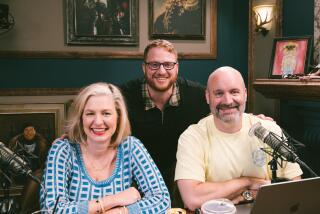A proving ground in 140 characters
Reporting from San Francisco — More than a year ago, CBS bought the rights to “$#*! My Dad Says,” a stream of salty pearls of wisdom from Samuel Halpern, a retired doctor from San Diego, posted by his 30-year-old son for the entertainment of nearly 2 million followers. The network turned it into a sitcom and last fall gave it a prime spot on its Thursday night schedule.
The first Twitter-inspired TV show, “$#*! My Dad Says” won the People’s Choice award for new television comedy in January, though it had so-so ratings (on average 10.6 million viewers). But agents say the project has triggered a wave of interest at CBS and in the television industry. TV networks on the lookout for fresh concepts and original voices are now regularly hearing pitches from writers strutting their stuff on the popular microblogging service that lets users send 140-character messages, or tweets, to followers.
“The next great undiscovered voice could be out there,” said William Morris Endeavor agent Lauren Whitney. She said there is “enormous interest” in those voices that can rise above the crowded din on Twitter.
“I think we will see other shows out of Twitter,” she said.
CBS is developing three: Jessica Alba discovered the tweets of a stay-at-home Canadian mother of three who chronicles her everyday life, and Alba signed on to executive produce “Mother of All Something,” loosely based on those tweets. Ashton Kutcher, one of the top celebrities on Twitter, has signed on as executive producer of “Dear Girls Above Me,” about a bachelor who offers insights into women gained by eavesdropping on his neighbors based on a Twitter feed by the same name. CBS has another show in the works called “Shh … Don’t Tell Steve,” a comedy based on a Twitter feed that blabs the exploits of one guy’s immature roommates.
CBS declined to comment on the projects. But agents say Hollywood is tuning into what is getting traffic and attention on Twitter because it has become such an accurate cultural barometer.
“The networks are looking for new sources for the next big idea and Twitter is definitely a part of that,” said Carolyn Finger, president of TVtracker.com, a Web-based consulting firm to the TV industry.
Twitter lends itself particularly well to comedies because popular feeds like “$#*! My Dad Says” showcase a distilled concept in a distinctive voice, Finger said. “$#*! My Dad Says” has done as well as it has because the Twitter feed helped the show develop two strong characters, a modern-day Archie Bunker (played on TV by William Shatner) at odds with his well-meaning son, she said.
“Twitter is obviously a media phenomenon where you see a lot of interesting people and their takes on life. Some of those have caught the attention of development executives,” said Lewis Henderson, chief executive of the Marketing Arm’s entertainment practice. “The best story is the human story and Twitter is bringing that human story to life.”
For writers, Twitter is an easy place to showcase talent. “To get a book published or to create a stand-up comedy career takes years and you have to get past a number of gates to get there. On Twitter, you can just appear,” Whitney said. “It’s a way to put your voice out in the world and see if anyone responds.”
Old-school media have been scouting the Web for fresh material for years. Internet copywriter Christian Lander of “Stuff White People Like” fame is one of many writers who turned blog success into book deals. Julie Powell turned her blog about cooking every recipe in Julia Child’s “Mastering the Art of French Cooking” into a bestselling book and then a major motion picture, “Julie & Julia” that netted $129.5 million at the box office worldwide and earned Meryl Streep an Oscar nomination.
Success stories like these have made it easier for others to leap from the freewheeling Internet into mainstream media as the Web’s power to generate word-of-mouth buzz continues to transform how consumers learn about new entertainment. The Village Voice even named anonymous Twitter account @Discographies as its music critic of 2010. The anonymous writer told the Village Voice a book based on his Twitter account was in the works.
“Who do you think should play me in the sitcom?” he asked.
“Social media has changed the celebrity game from top down to bottom up,” USC digital sociologist Julie Albright said. “It used to be that studios created stars and then cultivated an audience of fans for them. Now people can become celebrities by pushing content into social media and creating their own fan base.”
Not everyone is sold on the idea that Twitter can make good TV.
“I remember when the Twitter pitch sold,” said Justin Halpern, the struggling Hollywood screenwriter who created “$#*! My Dad Says.” “People said, ‘That’s a show being made off a Twitter page, that’s the worst idea ever.’ ” But, Halpern pointed out, the original medium wasn’t important. “Ideas come from anywhere,” he said.
Halpern was writing for Maxim.com and living at home with his parents in San Diego after being dumped by his girlfriend when a friend convinced him to turn his dad’s sayings into a Twitter account. He quickly became an Internet superstar engulfed by a whirlwind of interest. He ended up with his dream job: writing for a TV show he created. And he got back together with (and engaged to) his girlfriend.
“The whole thing was surreal, it happened so quickly,” Halpern said. “All I knew and know is that this was the shot I had. It could go away as quickly as it came.”
Halpern, who majored in TV and film production at San Diego State University, had sold one feature-length script that went nowhere. Then in August 2009 his Twitter feed took off, in part because former “The Daily Show” comedian Rob Corddry tweeted about it.
Halpern’s followers couldn’t get enough of his dad’s quips, such as “Oh please, you practically invented lazy. People should have to call you and ask for the rights to lazy before they use it.”
By September 2009, Halpern was being hounded by literary agents. By November, he had a deal with Warner Bros. and CBS. Halpern and his writing partner, Patrick Schumacker, were matched with the creators of “Will & Grace” to write a pilot episode. In May, CBS picked up the show and HarperCollins published his memoir. In June, the book topped the New York Times’ bestseller list.
Halpern winced at early reviews of “$#*! My Dad Says,” an old-fashioned, multicamera, studio audience comedy similar to CBS’ popular “Two and a Half Men” and “The Big Bang Theory.”
“I don’t think our pilot was fantastic. We were figuring it out. It’s just funny how personally angry people got,” Halpern said. “I wasn’t writing poetry in a basement in Romania. It’s a Twitter page.”
More to Read
The biggest entertainment stories
Get our big stories about Hollywood, film, television, music, arts, culture and more right in your inbox as soon as they publish.
You may occasionally receive promotional content from the Los Angeles Times.










